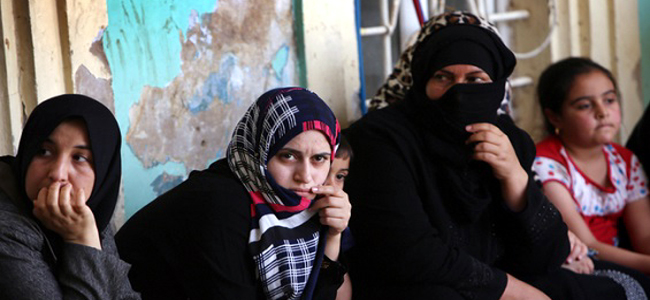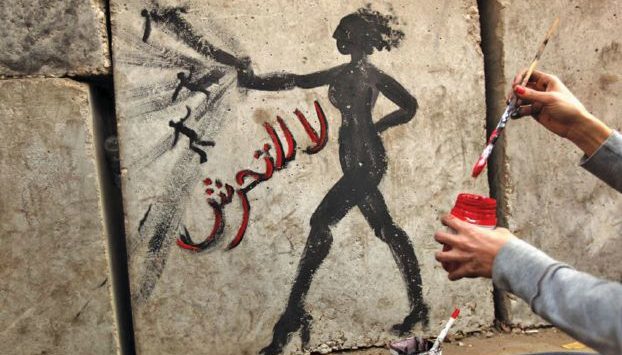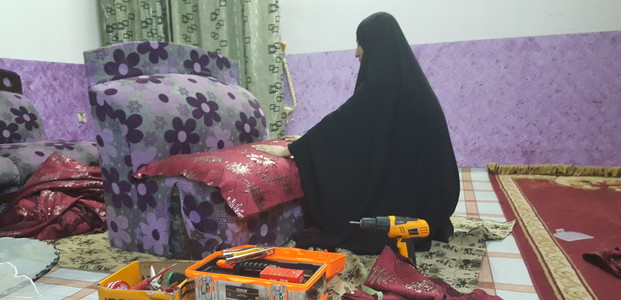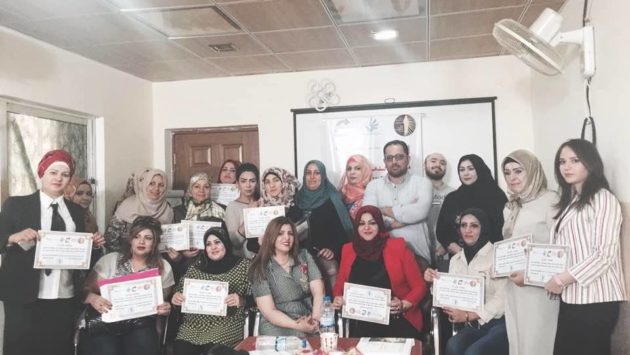Significant Growth in the Phenomenon of Domestic Violence in Iraq: 90% of Victims are Women!
Female judges confirmed significant growth in the phenomenon of domestic violence in the country, and pointed out that 90% of cases were brought by women. They attributed this to the deteriorating security and economic situation, which puts a tremendous amount of stress and pressure on the family.
The domestic violence court complained that as of yet, there is no law in place that can deal directly and effectively with issues of this kind. Given this lack, they have nothing to rely upon when victims come to court seeking justice. Thus, the domestic violence court has recently called upon the House of Representatives to speed up the legislation of such a law. The court also drew attention to the fact that there are insufficient places where those who have been convicted of domestic abuse can be detained.
Khaleda Cooley, judge in the domestic violence court, explained in a report for the judiciary authority that “the purpose of the establishment of this tribunal is to maintain relations and social ties, and to protect the family and children from violence in the home”.
Cooley says: “The structure of the court consists of an investigative judge, a deputy prosecutor, the judge of the case as tried in court, and officials from the Family and Child Protection department of the Interior Ministry, which includes a number of female officers.
Judge Cooley added “in accordance with Article 39, civil law limits the family to: father, mother, children and grandparents only”.
As to whether there is a special law for the court, she said: “because the domestic violence law is not enacted yet, the court’s decisions are currently based on the Penal Code and the Code of Criminal Procedure”.
She stated that “the civil law does not require that the family live in one house” adding that “when a girl marries, for example, the relations between her and her family don’t simply dissolve, and therefore if she is exposed to violence by her biological family, she has the right to lodge a complaint against them”.
Cooley showed that “crimes of domestic violence do not have a specific definition within Iraqi law, but we know that tracking them depends on the victim coming forward to report an offense, whether it be physical or psychological harm, insults or verbal abuse, threats, or, in extreme cases, even murder.’ She added that “in this type of crime, the case is brought to the court of domestic violence and after the completion of the investigation it is sent to the criminal court”.
She said “the imposition of discriminatory ideas and opinions within the family is one prominent form of domestic violence, and causes moral and psychological damage to the victim.” Though the aggrieved has ‘”the right to file a complaint”, the judge suggests that the absence of such complaints might well spring from the very “nature of society”.
Cooley stressed that “sanctions for this kind of crime are usually imprisonment or a fine, as is the case in European countries. This is also in the Iraqi Penal Code”.
She pointed out that “the existing laws do not address domestic violence specifically and directly, instead laws relating to violence deal more broadly, with everyone. However, the family she says, “needs a certain priority”, calling on “the legislation process to speed up the passing of a special law to take into account those issues that have traditionally seen to be private matters, including the possibility of psychological abuse within couples”.
She went on, saying that “the way to address this kind of problem is through rigorous social research.” Thus, she proposed that the “The Ministry of Labor and Social Affairs grant degrees to battered women who could then have distinctive roles in society, educating families and women about their rights, assuming that this would help to solve a big part of the problem”.
The judge explained the process by which one might file a complaint, which begins with “submitting an application to the investigating judge, and then being referred to the Family and Child Protection Department at the police station, and then referred finally to the judge of the domestic violence court“.
Cooley criticized “the Department of Family and Child Protection in police stations for not having social researchers”, and pointed out that “the executive bodies are weak, especially in terms of backing up the violation of law with punishment”. Additionally, many of those filing complaints have insufficient knowledge of just what the law states, which is needed in order to organize their complaints so that they correspond to the provisions of the Code of Criminal Procedure. This means that people can lose their rights simply because they are ignorant of what rights the law guarantees them. This lack of legal knowledge can also cause foot-dragging in the implementation of the arrest warrants”. Cooley claimed further that “there should be a special staff included in the entire Rusafa region with officers hired for the specific purpose of carrying out arrest warrants”.
Cooley also discussed the possibility of a child submitting a complaint against his/her family if he/she had been exposed to violence. Cooley reported that “a child is not able to submit a complaint unless he/she is over the age of 15 so that he/she can legally take an oath”, She added that “If the child in question is a minor, how can we allow him/her to complain about his/her family given that there is a provision in the law stipulating that the parents have the right to discipline their children?”
Cooley criticized the court, saying that “it has always relied on the excuse that there is a lack of shelters for abused children and women, and therefore the court should not be held responsible for them”.
In terms of communication between the Court and the Committee on Women and Children in the House of Representatives, Cooley said simply that “there is no coordination. The committee did not consult us about the text of the proposed law, despite the fact that the court has vast and critical experience with the problems ‘on the ground’ which the law must address. After all, the practical side of this issue is very different from its theoretical side”.
She pointed out that “most of the complainants are women”, stressing the need to have “a staff made up of women for ease and increased understanding.” She added that “families now tend to trust the court, and this is a positive thing”.
Cooley believes that “there is a significant growth in crimes of domestic violence”, and attributed this rise to “several factors, the most important being insecurity within Iraq, which impacts the family negatively”.
“Economic factors play big role in domestic violence: increasingly many people are forced to share smaller living spaces and this is the main reason for many of the problems that arise in the home”.
The judge revealed that “these crimes are not limited to people with little education, but also extend to intellectuals, and even at times to the level of university professors”.
Maha Mohi Majeed, the Deputy Prosecutor said that “the prosecution plays a major role in domestic violence cases, as we are the ones who monitor the decisions of the judge, and we ask for bail if the case requires it”.
Majeed reviewed several obstacles facing the court, including “the lack of a place to house those arrested for crimes of domestic violence”, adding that “It is wrong to detain those accused of this type of crime with terrorist suspects”.
She added that currently “detainees and convicts are held in the court in the Al-Shaab police station, which is now severely overcrowded. Therefore it is not possible to detain a person here who’s had a problem with his wife. Furthermore, this would have negative psychological effects on the couple as it would likely generate resentment in the man for his wife”.
However, “if a woman is found guilty, the difficulty is larger still. To detain her with women who have been convicted of serious crimes contributes to society’s base perception of women”.
Majeed said that “numerous times, the court has requested that the Ministry of Interior establish a special detention center, but to no avail”.
Majeed went on to say that “the court does not have access to any specialized laws on domestic violence. This is particularly problematic as there are now in place provisions with which such laws would be incompatible, specifically, the idea that the husband has the right to discipline his wife”.
She pointed out that in “90% of the cases of domestic violence, women are the victims, but the court has recorded cases where a man is the victim and submitted a complaint to the court”.





